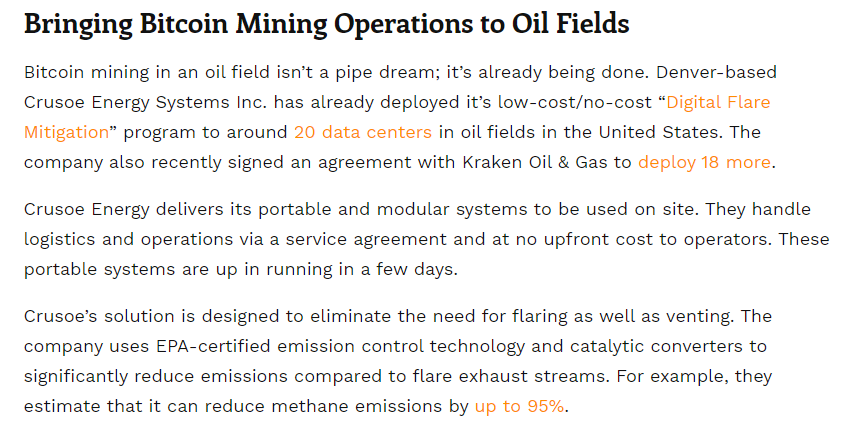Let's discuss how little you actually understand about economics and energy.
The first thing to understand is that energy is not globally fungible. Electricity decays as it leaves its point of origin; it’s expensive to transport. There is a huge excess (hydro) in many areas.
Let's discuss the environmental cost of bitcoin. Because despite all the push for sustainable and green investment in the tech sector, there's a giant smoldering Chernobyl sitting at the heart of Silicon Valley which a lot of investors would prefer you remain quiet about. \U0001f9f5 (1/)
— Stephen Diehl (@smdiehl) January 17, 2021
You wouldn't argue that we are producing *too much* electricity from renewables, right?
Many previous estimates have quite faulty methods and don't take into account the actual energy sources. Is it fair to put a GHG equivalent on hydro or solar power? That would seem a bit disingenuous, no?

Recently the petro industry has experimented with burning CH4 "flare-offs" to power Bitcoin miners, cutting methane emissions and reducing warming potential.

https://t.co/WaleCRMh51
More from Economy
Post-industrial towns, run-down suburbs, coastal communities - these places were already struggling before the crisis and have fared worst in the last year.
What should we do?
Today, @ukonward sets out the beginning of a plan to repair our social fabric. It follows our extensive research over the last year, expertly chaired by @jamesosh, and funded by @jrf_uk, @Shelter and @peoplesbiz.
https://t.co/d3T5uPwG9N

Before I get into recommendations, some findings from previous Onward research.
In 2018, we found 71% of people believe "community has declined in my lifetime"
In 2019, we found 65% would rather live in “a society that focuses on giving people more security” vs 35% for freedom

This was the basis for our identification of 'Workington Man' as the archetypal swing voter in 2019, and led us to predict (correctly) that large numbers of Red Wall seats could fall. A key driver was a desire for security, belonging and pride in place.

There is also a key regional dimension to this. We also tested people's affinity with the UK's direction of travel, across both cultural and economic dimensions - revealing the extraordinary spread below: London vs. the Rest.
https://t.co/HrorW4xaLp

She echoes propaganda against Syria, Iran, and China and is silent about Venezuela, Nicaragua, etc
Far too much of the 'left' is into a joke version of "anti-imperialism" which denies state atrocities in the global south.
— Priyamvada Gopal (@PriyamvadaGopal) January 14, 2021
Anti-anti-imperialist Cambridge University Professor @PriyamvadaGopal smears opponents of the Western neocolonial war on Syria as "Assadists"
Would she ever call liberal imperialist Obama a "blood-soaked cretin"? He has exponentially more blood on
Let us be in no doubt: there is nothing anti-imperialist about supporting a blood-soaked cretin like Assad. https://t.co/nuzJE6xUy5?
— Priyamvada Gopal (@PriyamvadaGopal) February 21, 2018
The CIA spent over a billion dollars per year arming and training "rebels" who massacred and ethnically cleansed Syrian civilians, especially religious minorities.
But anti-anti-imperialist @PriyamvadaGopal insists these CIA-backed contras are
Deeming non-ISIS Syrian resistance CIA stooges: embarrassing, insulting and patronising
— Priyamvada Gopal (@PriyamvadaGopal) November 29, 2015
This was elite anti-anti-imperialist Cambridge University gatekeeper @PriyamvadaGopal's response right after colonial powers the US, UK, and France bombed Syria in April 2018 on bogus lies that have since been
Am truly glad that a lot of people are 'holding Syria in their thoughts' since last night. Was there a reason they weren't being 'held in your thoughts' since 2011 when Assad crushed a popular uprising and kept bombing his own people with Russian assistance?
— Priyamvada Gopal (@PriyamvadaGopal) April 14, 2018
Of course anti-anti-imperialist Cambridge Professor @PriyamvadaGopal's is also a supporter of the neoliberal imperialist European Union -- one of the key institutions of European necolonialism
Worth your realising that over this, over Syria, over Brexit, you are swiftly losing enthusiastic support we once offered you
— Priyamvada Gopal (@PriyamvadaGopal) November 9, 2016
























